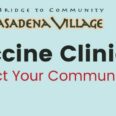
The first course at D.A.D.S. is dinner. Each Monday evening at the Flintridge Center, 236 W. Mountain St., Suite 117, fathers from across the San Gabriel Valley take their seats at long tables before any curriculum begins, passing plates and trading small talk that, by degrees, softens into candor.
“It’s often said that a hungry student can’t learn — and we take that to heart.” said Edwin Hernandez, the program director. “At the D.A.D.S. Program, we understand that our fathers arrive to class after long days of work, parenting, or both. That’s why we begin each weekly session with a shared meal.”
A decade in the making
D.A.D.S. — short for “Dads Are Dependable Solutions” — emerged from the Flintridge Center’s Institute Vision 2020 initiative, originally led by Florence Adoja Annang, K-Rahn Vallatine, and Chris Finney. Hernandez, a graduate of the Institute’s 10-week, 11-module leadership course, built D.A.D.S. from that cohort’s applied project and steered it into a standing program.
The Institute itself had been revitalized in 2021 during a spike in local violence and has since graduated nearly 70 participants, spawning other community-led projects such as My Tribe Rise and Emancipate Me.
In that lineage, D.A.D.S. represents the fathers’ branch: neighbors with lived experience guiding other neighbors, rather than outside experts parachuting in. The program embraces a broad definition of fatherhood — welcoming new dads and seasoned ones, stepfathers and would-be fathers, even older brothers or male guardians in father-figure roles — on the premise that caregiving seldom fits a single mold.
Program design and weekly cadence
Each cohort moves through a curriculum that blends mental-health literacy, trauma awareness, relationship skills, and self-care, with Monday sessions always opening under the banner “Breaking Bread Together.”
The premise is simple but insistent: connection first, instruction second.
“We don’t just feed the body — we feed the connection.” Hernandez said. “By sitting down together for what feels like a social dinner, we create a space where walls come down and trust is built.”
Another refrain underscores the dynamic of those meals: “When we eat together, we bond together — and from there, the energy in the room shifts. The discussions that follow are deeper. The learning is more meaningful. And the support becomes real.”
From there, facilitators and guest mentors layer in legal navigation, workplace coaching and, where needed, referrals into a wider safety net the Flintridge Center already runs — Youth of Promise for young people, an Apprenticeship Preparation Program for trades careers, and reintegration services for those returning from incarceration.
Measuring impact
Since its first graduation on Oct. 15, 2024 — when eight fathers completed the course — D.A.D.S. has served more than 35 participants across three cohorts, with the third group launching in August.
The briefs catalog outcomes that are concrete, if varied: one father, despite being the primary caregiver, began with no custody rights and now has 50 percent joint custody; another expunged a criminal record and was hired by the Pasadena Unified School District; a third began regular therapy after learning in class that seeking help is acceptable. Two fathers advanced into union trade pathways through the Center’s apprenticeship pipeline.
Roughly 80 percent of participants come from Pasadena, though the tables draw men from across the San Gabriel Valley, suggesting the need transcends city lines.
Funding and institutional support
While D.A.D.S. is nested inside the Flintridge Center’s larger ecosystem, its partnerships are granular and personal — evenings when a volunteer like Richard Roman, a professional-development coach, joins to rehearse interviews or refine résumés with participants one by one.
The architecture is neither clinical nor bureaucratic; it is relational. That design choice follows the Institute’s peer-education ethos: “neighbors with scars” rather than “outsiders with theories.”
The program’s stated mission — “to empower fathers to thrive personally and parent effectively” — is less a slogan than a working brief that binds shared meals to case management to job placement, all under one roof and within a familiar neighborhood setting.
Traditions that signal a shift
Graduation nights end with certificates — and flowers.
“88% of men don’t receive flowers until their funeral.” Hernandez said. “So, at every graduation, we present each of our dads with a bouquet of roses and their certificate of completion. For many, it’s their first-time receiving flowers — and they’re always deeply moved.”
Another guiding principle is voiced often: “Hurt people hurt people. Healed people heal people.”
Hernandez also reflects more broadly: “These dads deserve their flowers while they’re still here — and so much more.”
These gestures, small in cost and large in message, spotlight the program’s ethos of treating fathers not as problems to fix but as partners, whose future choices are shaped by whether they feel seen in the present.
A gap in services, and a model to replicate
“Unlike many parenting programs, which are often limited in scope or tailored toward mothers, there are very few support systems specifically designed for fathers in Pasadena — and even fewer that embrace the full spectrum of what it means to be a dad.” Hernandez said.
The program aims to close that gap, in part by seeking formal recognition from family courts and social workers who could refer fathers to the program.
The long-term plan imagines a dedicated facility — a one-stop center where legal aid, job training, parenting classes and case management are housed together — and broader outreach that meets fathers across languages, races and neighborhoods.
Looking forward
For now, the table is the through-line — the anchor for Monday nights and the message the program pushes outward, through word-of-mouth and even an Instagram handle (@dependabledads24) that signals a public face.
The cadence remains steady: recruitment, 10 weeks of shared work and shared meals, graduation, then a new cohort.
“This isn’t just a program.” Hernandez said. “It’s a movement toward redefining what fatherhood looks like — with dignity, strength, and compassion.”
Whether that movement scales will depend on sustained partnerships and the program’s ability to keep pairing tangible outcomes — custody orders, expungements, apprenticeship slots — with the quieter, cumulative work of trust.


















